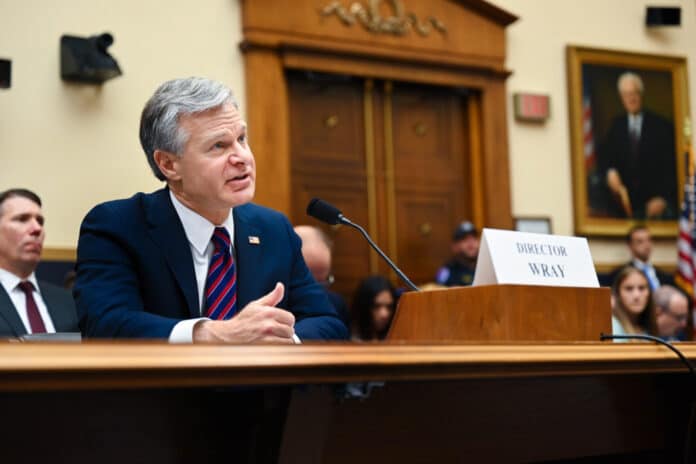
(The Daily Signal) — FBI Director Christopher Wray, testifying Wednesday before the House Judiciary Committee, sought to address a wide range of scandals that have engulfed his agency in recent years and months.
Much of the hearing proved partisan, with Democrats praising Wray, who was appointed by then-President Donald Trump after he fired James Comey as FBI director in May 2017.
Here are six of the biggest highlights from the often contentious hearing.
1. ‘Protecting the Bidens’
Rep. Matt Gaetz, R-Fla., read a 2017 text from President Joe Biden’s son, Hunter Biden, in which he tells a Chinese business partner that he is sitting beside his father and expects a big payment immediately from that partner. (The senior Biden had just completed eight years as Barack Obama’s vice president following 36 years in the Senate representing Delaware.)
“Sounds like a shakedown, doesn’t it, Director?” Gaetz asked Wray.
Wray responded: “I’m not going to get into commenting on that.”
Gaetz: “You seem deeply uncurious about it, don’t you? Almost suspiciously uncurious. Are you protecting the Bidens?”
Wray: “Absolutely not. The FBI has no interest in protecting anyone politically.”
Gaetz retorted: “Everybody knows why you won’t answer it. Because to the millions of people who will see this, they know [what the reason] is — and your inability to acknowledge that is deeply revealing about you.”
Rep. Tom Tiffany, R-Wis., asked Wray about allegations from an FBI informant that an executive of the Ukrainian energy company Burisma paid a $5 million bribe to Biden when he was vice president.
“Did Joe Biden take payments from Burisma or any other foreign companies as vice president, president, or as a private citizen?” Tiffany asked.
Wray didn’t give a direct answer, but did refer to an “ongoing investigation” by U.S. Attorney for Delaware David Weiss, one that seems to have focused on Biden’s son, Hunter Biden.
“As you may know, there is an ongoing investigation being led by the U.S. attorney in Delaware, Mr. Weiss, that our Baltimore office is working with,” Wray said, “and I would refer you to him as to what, if anything, can be said.”
Tiffany followed up by asking: “So the president is under investigation?”
“I’m not going to confirm or speak to who is or isn’t under investigation,” Wray said.
2. ‘One or more’ FBI assets at Capitol riot?
Rep. Steve Cohen, D-Tenn., scoffed at the notion that the FBI orchestrated the Capitol riot that occurred Jan. 6, 2021, naming former Fox News host Tucker Carlson as the source of the theory.
Wray responded: “I would say that this notion that the violence on Jan. 6 was part of some operation orchestrated by FBI sources and agents is ludicrous and is a disservice to our brave, hardworking, dedicated men and women.”
Shortly after that, Rep. Darrell Issa, R-Calif., said that he’s ready to move beyond the events of that day, but Democrats aren’t. So Issa had one follow-up question that Wray couldn’t answer.
Issa asked whether “one or more” individuals associated with the FBI were in the crowd or in the Capitol on Jan. 6, 2021. Wray referred to an unspecified court filing that he didn’t want to contradict.
“I just want an answer,” Issa said. “Was there one or more? You would know if there was at least one individual who worked for the FBI who entered the Capitol on that day.”
Wray answered: “Again, I just can’t speak to that here. But I will be happy to get the court filing.”
Issa noted to the FBI director that it has been more than two years since the Capitol riot:
“I ask you simply was there one or more. And you won’t answer that. So I’m going to make the assumption that there was more than one. More than five, more than 10. And that you are ducking the question because you don’t want to answer for the fact that you had at least one and somehow [are] misunderstanding that some of the individuals were very dangerous and that there were others inciting individuals to enter the Capitol after others broke windows.”
Later in the hearing, Rep. Andy Biggs, R-Ariz., posed a similar question to Wray.
“How many agents or human resources were present in the Capitol complex or vicinity on Jan. 6?” Biggs asked.
Wray replied: “It’s going to get confusing because it depends on when we deployed and responded to the breach.”
Biggs: “You and I both know we are talking different things here. Don’t distract. We are focusing on those who were there in an undercover capacity on Jan. 6. How many were there?”
Wray: “Again, I’m not sure I can give you that number as I sit here. I’m not sure there were undercover agents on scene.”
Biggs: “I find that kind of a remarkable statement, director. At this point, you don’t know if there were undercover FBI agents in the crowd or in the Capitol on Jan. 6?”
Wray: “I say that because I want to be very careful. There have been a number of court filings related to some of these topics, and I want to make sure I stick with what’s in that.”
He added: “I do not believe there were undercover agents on the scene, FBI agents.”
Biggs: “Did you have any assets in the crowd?”
Wray: “When it comes to what you are calling assets, or what we would call confidential human sources, that’s, again, a place where I want to be careful.”
3. Millions spent on Steele dossier, Hunter Biden laptop
Later in the hearing, Rep. Barry Moore, R-Ala., asked Wray about the FBI’s approach to the 2016 and 2020 presidential campaigns.
“Why would the FBI offer Christopher Steele $1 million to verify a dossier about Trump-Russia collusion and then the same FBI offer $3 million to Twitter to squash the story on the Hunter Biden laptop?” Moore asked.
“You raise a number of different issues,” Wray replied, before referring to special counsel John Durham’s report on the origins of the FBI’s Trump-Russia investigation. “The Steele dossier is treated at great length in the Durham report and again, predates my time as director.”
Moore pressed: “It was the same agency paying $1 million to push one story out or try to corroborate one story, and $3 million to quieten another story for a political opponent.”
Wray said such FBI payments to companies are normal.
“When there are payments to social media companies, that is by longstanding federal law going back about four decades, where we have to pay companies for their cost in responding to legal processes,” Wray said. “It’s not just social media companies. It’s other kinds of business as well.”
Hunter Biden’s laptop, which congressional Republicans and others argue contains evidence of influence peddling in foreign nations, has been in the FBI’s possession since 2019.
4. Arresting a pro-lifer at gunpoint
Rep. Chip Roy, R-Texas, asked about a September incident when 20 armed FBI agents went to the home of pro-life activist Mark Houck in Pennsylvania.
“This was after Mr. Houck’s lawyer reached out and said he would voluntarily appear because the incident in question occurred almost a year earlier, in October of 2021,” Roy told Wray.
“Local authorities investigated the incident but concluded there was no case,” Roy added. “After the jury met for roughly an hour, Houck was acquitted. How on earth did Mark Houck end up having the FBI send several armed agents, along with local authorities, to arrest him at gunpoint? Did you approve of that?”
Wray said decisions about the manner of arrests aren’t something the FBI director approves.
“I defer to and rely on the judgment of the experienced career agents on the ground who have both the most intimate understanding of the facts and of the training experience to understand how best to effectuate an arrest,” Wray said.
Roy later followed up with a series of questions.
“Do you approve of the raid now, in retrospect?” Roy asked. “Do you think it was appropriate for a father to have armed FBI agents along with local agents, go to his home, arrest him at gunpoint for alleged violations of the FACE Act a year after the alleged incident happened, after the father had said through his lawyer that he would appear voluntarily. Do you believe that FBI agents should go to the home of a father in the Philadelphia suburbs?”
Wray stood by the decisions of FBI officials.
“I’m not going to second-guess the judgment of the career agents on the ground who made the determination,” Wray said.
But that is his role as FBI director, Roy responded.
“Your job is to second-guess and take a look at what they are doing,” Roy said. “Your job is to review what they do. Your job is to protect the American people from a tyrannical FBI storming the home of an American family.”
Wray took exception to that.
“I could not disagree more with your description of the FBI as tyrannical. I don’t believe it is tyrannical,” the director said.
Roy replied: “You don’t believe it’s tyrannical that the FBI agents were part of storming a father’s home in suburban Philadelphia?”
The agents didn’t storm Houck’s house, Wray insisted.
“They came to his door. They knocked on his door and identified themselves,” he said. “They asked him to exit. He did without incident. Whenever our agents conduct an arrest, our agents are armed virtually all the time.”
However, earlier in the hearing, in response to a question from Rep. Adam Schiff, D-Calif., about monitoring violent extremists, Wray noted briefly that the FBI is investigating violent groups targeting pro-life organizations such as pregnancy resource centers.
After the Supreme Court overturned Roe v. Wade last summer, ending what pro-life activists call abortion on demand, Jane’s Revenge and other extremist groups fire-bombed or vandalized crisis pregnancy centers.
“Domestic violent extremism cuts across the spectrum from racially motivated extremism, militia extremism, anarchist violent extremism, environmental violent extremism, and of course, recently, we’ve had a lot of violent extremism attacks against pro-life facilities. We are investigating those,” Wray said.
“So, it really covers a wide spectrum,” the FBI director said. “What they all have in common is three things: violence or threats of violence; motivated by some ideology, and it varies; and violation of federal criminal law.”
5. ‘Radical traditional Catholics’
Wray avoided questions about the FBI’s targeting of Roman Catholics by referring to a forthcoming “internal review.”
House Judiciary Chairman Jim Jordan, R-Ohio, read from an FBI memo about plans to “mitigate extremism” with outreach to Catholic parishes “with the placement of sources to report on places of worship.”
“That’s pretty fancy language for ‘They are trying to put informants in the parish, in the church,’” Jordan said.
The Ohio Republican later asked, “Do you think priests should be informants in the church, director?”
Wray responded: “We do not recruit, open, or operate confidential human sources to infiltrate, target, or report on religious organizations.”
Jordan noted that that’s what the Jan. 23 memo from the FBI Richmond field office said. (The bureau’s national office rescinded that memo Feb. 9.)
“You can assure us this didn’t happen?” Jordan asked Wray about investigating traditional Catholics.
Wray replied: “That product, as best as we can tell, did not result in any investigative action.”
Jordan asked, “Do you know what the motivation for this was?”
“I think that’s what our internal review will find,” Wray said.
“Well, I don’t need an internal review,” Jordan said, holding up the original FBI memo. “I can read the document. I assume you can do the same, because it says right there on the same page, ‘Richmond assesses extremist interest in radical traditional Catholics is likely to increase in the next 12 to 24 months in the run-up to the next general election.’”
“It’s politics,” Jordan added. “That’s the motivation. In ‘the run-up to the next general election’ and they talk about the border, affirmative action, and abortion rights? … How soon are you going to complete this internal investigation, so we can talk to these folks who put this together?”
Wray answered: “I expect us to be able to brief the committee on our internal review later this summer.”
6. ‘Commercial sources’
Although committee Democrats mostly sided with Wray, two unsuccessfully pressed the FBI director for information about how the bureau is making end runs around warrants to obtain information on American citizens. They got some backup from Republican colleagues.
Rep. Zoe Lofgren, D-Calif., asked: “Is the FBI purchasing location data from commercial sources without a warrant?”
Wray ducked the question.
“This is an area that requires a little more precision [and] context for me to be able to answer that for you,” Wray said. “I’ll have my staff follow back up with you so I’ll make sure I don’t leave something important out.”
Lofgren had more questions, including about the Foreign Intelligence Surveillance Act.
“The FBI had 3.4 million backdoor searches of the FISA database without a warrant in 2021. Can you say whether the FBI is continuing to search the FISA database without a warrant for Americans?” she asked.
“There is no Fourth Amendment requirement for a warrant for those queries,” Wray said, further clarifying: “That’s not 3.4 million people, that’s 3.4 million search terms. Those are not queries in violation of rules.”
“My time is expired,” Lofgren said, “but we will look into the warrant requirement later.”
“We sure will,” Jordan said.
Gaetz argued that it’s absurd that the FBI director couldn’t answer his Democrat colleague’s question.
Later in the hearing, Rep. Pramila Jayapal, D-Wash., chairwoman of the House Progressive Caucus, asked about the same matter.
Jayapal cited a June report by the Office of the Director of National Intelligence:
“Just last month, the ODNI declassified a report revealing the FBI and other agencies do purchase significant amounts of commercially available information about Americans from data brokers. And the report notes that commercially available information ‘has increasingly important risks and implications for U.S. persons’ privacy and civil liberties as commercially available information can reveal sensitive and intimate information about individuals.'”
Wray again said he would have his staff provide a briefing to lawmakers.
















